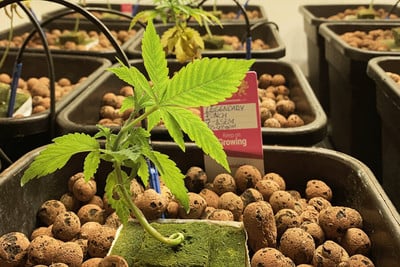.

Getting Ready To Grow Hydroponically With Mitchell
Hello! My name is Mitchell Gorgichuk. I'm a serial entrepreneur that recognized an opportunity to provide growers with superior products that enhance yield and simplify their hydroponic operations. I've created Visionary Hydroponics Inc through the passion of growing indoors and to offer products that allow growers to spend more time on their plants.
Some growers enter the world of hydro from a soil-based background, whereas others jump right in with no experience at all. No matter where you start from, growing hydroponically can quickly become confusing. That's why we chose to interview Mitchell Gorgichuk. As the creator of Visionary Hydroponics Inc, he knows a thing or two about growing thriving plants using this technique. During his time as a grower and inventor, Mitchell has figured out reliable ways to achieve superior yields and improve water efficiency. Leverage his knowledge and experience to get a head start.
1. How did you start out, and what made you decide to grow hydroponically? (1:03)
When I found out it was going to be legal to grow cannabis in Canada, I immediately ordered books, read them, and applied the information to where I lived and what worked for me growing in a basement with four plants. I needed it to be clean, I needed it to be discreet. That’s how I decided on hydroponics and deep water culture. From there, that’s when I started growing tomatoes, vegetables, cucumbers, leafy greens—everything I could in preparation for legalization.
2. Can you tell us a little bit of the story behind hydroponics? (2:40)
Around 15 or 20 years ago, it used to be more important than it is now to be discreet in some parts of the world—so, not carrying soil and stuff in and out of a house. Of all the hydroponic methods, deep water culture stood out to me. I struggle with underwatering my plants, because I tend to forget about them, so I think that’s really appealing to anyone who wants to cut down their daily to-do list.
3. Is it true that hydroponically grown plants develop much faster than in soil? (6:54)
Absolutely. When you hit the really key requirements there are in hydroponics, your plants will have everything they need. You are there to maintain parameters; to control the environment. There are really only three things that you're after; you're controlling the strength of your nutrients—your parts per million—you're controlling your pH, and you're controlling your temperature. People report anywhere from 30 to 40% faster growth in deep water culture, because plants are not ever waiting to be watered; they're always watered.
4. How important is the growing medium we use? (9:18)
The different media you're looking at are soil—that’s the bulk of growers—and then you have coco, an inert medium, which would be considered hydroponics. The most common medium in deep water culture is Hydroton expanded clay pellets. But you can use anything suitable you’d like. When you're talking about the way Hydroton is used, it's really to support the plant. You could use gravel, you could use sand, you could use nothing! You really don't need a medium unless you're using it to accomplish something.
"The plant has everything it needs, especially if we know how to balance the solution nicely, and it's not very hard. In fact, it's very easy."
5. How can we prevent pests from invading our growing operation? (11:46)
One thing to consider is that with hydroponics, you simply have fewer pests. Because you don't have an organic medium—you don't have soil, you don't have all these things that literally bring bugs with them—you’re automatically avoiding a large share of pests if you’re using Hydroton or Rockwool. The second thing is—I'm always sure to keep my grow clean, cleaning the floor and not having any dead leaves. That's good garden practice; it means you don't leave stuff decaying around for bugs to come looking for. And then, of course, having a good routine, whether you have pests or not.
6. How can we figure out which hydroponic system works best for us? (14:56)
Just go straight to deep water culture. That's what's going to work best. It just takes away the vulnerable periods because the roots are always in there; they're always in the solution. The plant has everything it needs, especially if we know how to balance the solution nicely, and it's not very hard. In fact, it's very easy. If it has everything it needs, there's no risk of it drying out; there's no risk of an emitter plugging; there's no risk of a pressurised pump breaking over a line and flooding your house; there's no risk of a timer not going off...
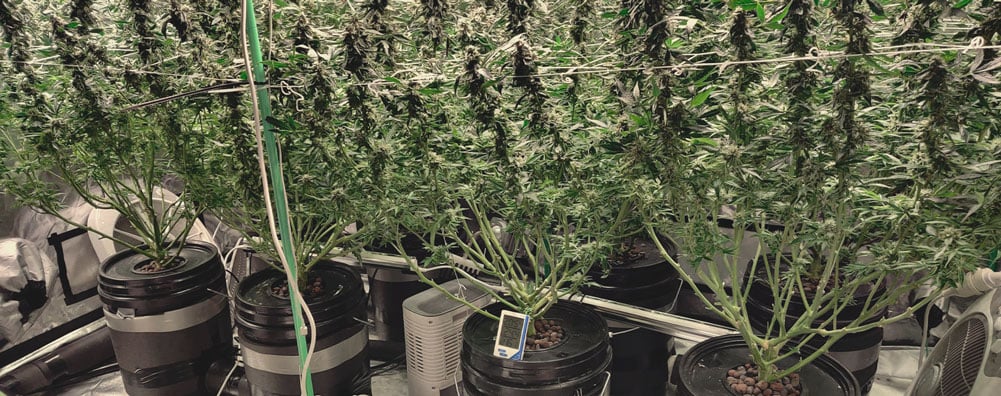
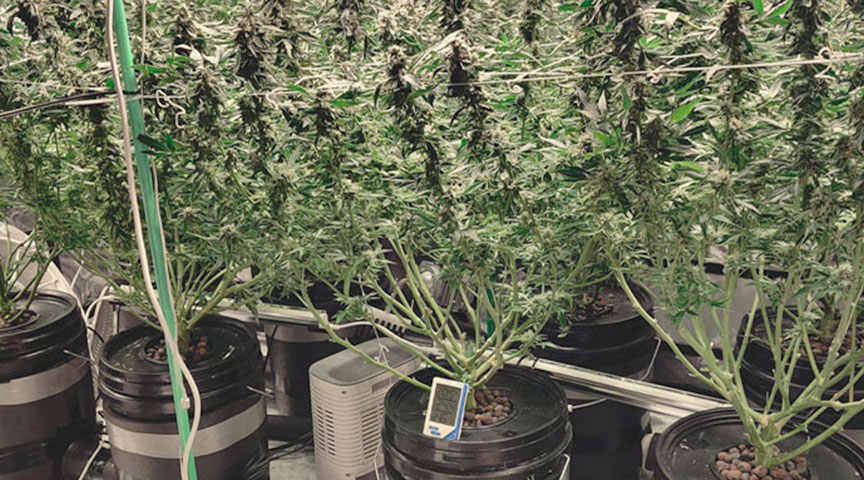
7. Can you describe to us how you train your plants to make them bigger? (20:01)
When we're talking about power—let's say we're talking about 300 watts—if those 300 watts are not hitting the canopy and going directly into the plant, that's not really a very effective way of growing. Whether I grow from a clone or seed, I will do a mainline split once the plant develops three, four, five nodes—it depends on how the plant looks according to its genetics. And then, just as the buds are developing, while there are still symmetrical nodes coming out, I will do a topping, but just on the tiniest, smallest spot.
8. Do you recall your budget when you first started using DWC so we can compare it to a soil grow? (25:07)
I would say you could now get into deep water culture for under $100. Go get a hydro bucket, a net pot, some medium, a small air pump with an air stone and an airline. Once you purchase your grow equipment, it really lasts a long time if you take care of it.
9. What do we need to maintain an optimal growing environment? (28:28)
The optimal growing environment consists of two main areas. You have to control your temperature, your parts per million, and your pH—that's your root control zone. And then you also have to control your surrounding environment; your exhaust fans, timers—I mean, those things are extremely valuable.
10. Are there some strains that work better in an indoor hydroponic system? (31:23)
I couldn't speak to specific strains, but I do know that indicas and certain hybrids that take on a shorter, smaller shape are more ideal. Indoors, you're limited by height, light, heat, and all these things. You have to remember that your plant is going to double or triple in size.
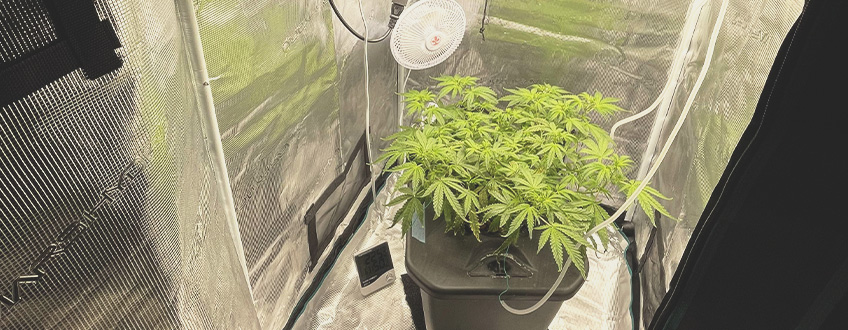
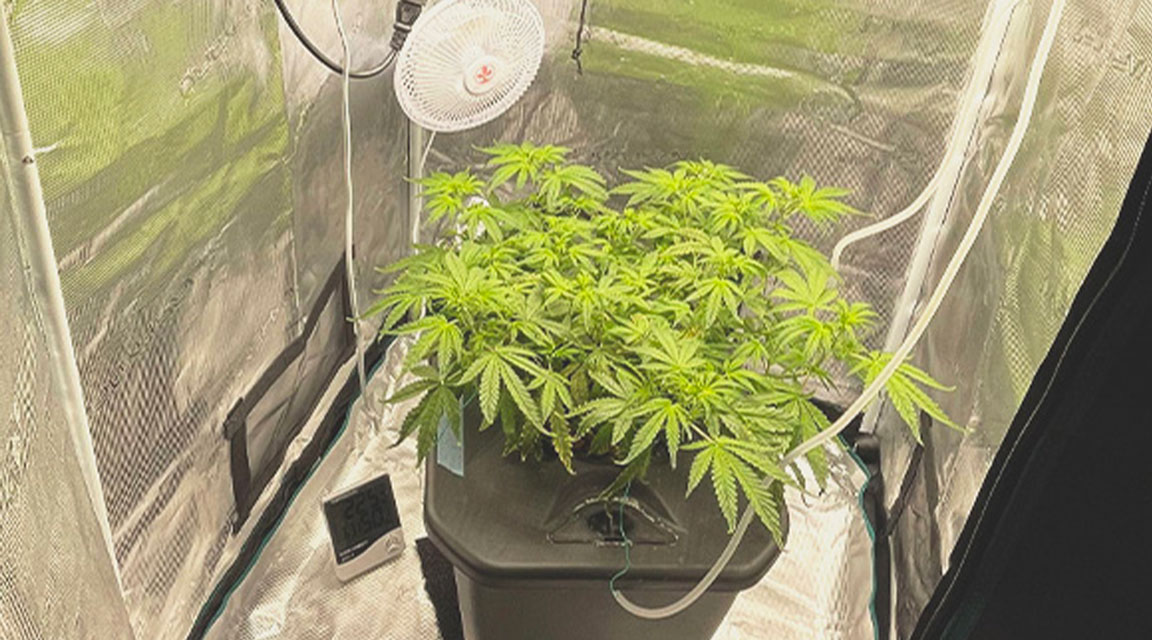
11. Do you have any experience growing autoflowering plants using hydroponics? (33:10)
Yes, I'm practising now with autoflowers. I really love them because they help people just grow. They allow people who don't have all the availability of cloning to achieve a harvest. It's just like a tomato, right? You just take your seed, you plant it, and you know you're going to get tomatoes. That's how autoflowers are. You don't have to do anything special, except give it the right environment. I have been playing with autoflowers for this reason, because I just see that they're so wonderful. They're awesome for new growers.
12. How can we manage reservoir temp without a water cooler? (37:30)
If you want to grow in deep water culture, you have to have a recirculating system to control your water temperature. You can have an external reservoir, which would work like this; you'd have your four plants in your tent, then the external reservoir, which is another tote, connected to them, and then that allows you to manage your reservoir solution. But you have pumps moving all that fluid around through tubes and coming and going. And by volume, you're using more, and so you have to use a water chiller.


























